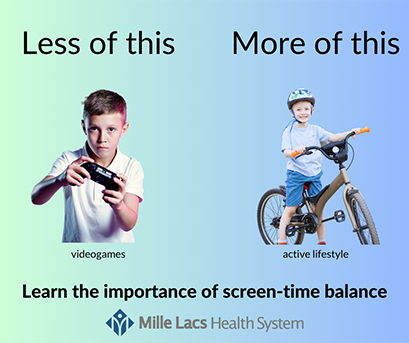Screen-time balance
April 28, 2023
Screen-Free Week is celebrated every May during the first week of the month. It serves as an annual reminder to play, explore, get outside, and rediscover the joys of life beyond screens. It first began as “TV Turnoff Week” in 1994, and in 2010 shifted to “Screen-Free Week”.
Even though it is called “Screen-Free Week” it isn’t about going without entirely, as we all know most of us still need screens on a daily basis for work, school, etc. The idea is to encourage trading the downtime that we commonly fill with computers, TVs, phones, etc for something different. Time not in front of a screen can be spent outside being active, reading a book, exploring your creativity through drawing, or any other activity that interests you.
Technology does serve a great purpose in entertainment, education, communication, and more. The key is to use it for positive purposes, and not just mindless entertainment. Especially when it comes to children, there are many games, apps, & websites that can be both fun & educational.
For children that have excessive screen time, there are health complications that can commonly occur, such as: obesity, poor sleep, behavioral problems, impaired academic performance, tendencies to violence, attention problems, and being less physically active overall.
When it comes to recommendations for limits on screen time it varies by age for children. The American Academy of Pediatrics recommends that babies under two years old are generally a no-screen zone. Between the ages of 18 – 24 months, video chats with out-of-town family members and the occasional high-quality educational show can be a start to introducing them to screens.
From two to five years old one hour or less per day of screen time, preferably done together with adult and child is recommended. Avoid screen time at least two hours before bed, and now is a good time to start to set boundaries such as no screen at mealtime.
From six to twelve years old children are now likely getting screen time exposure at school and at home. Setting limits on the amount of time allowed each day is important and so is establishing boundaries such as only using technology in public spaces in the home (not hidden away in bedrooms), and talking about the dos and don’ts of sharing information online.
During the teen years, it is important to further talk about the proper use of communication and sharing information online in addition to other safety items such as not texting while driving. Cyberbullying can be a real concern in this age group. It’s also important to understand things posted online don’t necessarily disappear and can affect you later in life.
Let this Screen-Free Week serve as a reminder to you to keep a healthy balance of screen time used for educational, social, and a little bit of entertainment time in your life. Fill in the majority of your free time with things to promote your physical and mental health.
